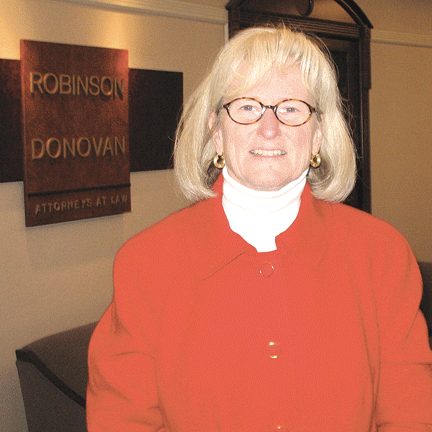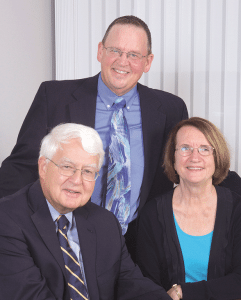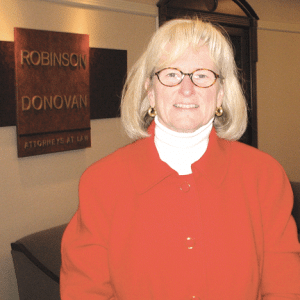
Face to Face
Divorce Mediation Growing in Popularity

Bruce Clarkin (seated, with Michael Frazee and Kathleen Townsend) says mediation empowers a divorcing couple in ways litigation cannot.
“When two people divorce, they live in the problem,” he said. “In mediation, they live in the solution.”
If that’s true, then more divorcing couples than ever are living in the solution, turning not to a judge to hammer out their finances and parental rights, but to an impartial, certified mediator, who guides the couple, through face-to-face conversations, to a negotiated settlement of their issues.
“There’s an old saying that one way a judge evaluates the success of a divorce is if both clients are equally unhappy,” said Bruce Clarkin, founder of Divorce Mediation Group in Springfield, where he partners with fellow attorneys Frazee and Kathleen Townsend.
“Our perspective in mediation is just the opposite,” Clarkin told BusinessWest. “We’re not looking for unhappy clients; we’re looking for our clients to put together a functional arrangement that meets their needs and the needs of their kids. It’s a totally different perspective.”
It’s important to remember, he said, that divorce isn’t just the end of something, but a beginning for at least two — and often more — individuals. “We’re helping people transition to the next phase of their lives in such a way that they’re meeting their goals.”
In 1990, the first year Clarkin began offering this innovative service, he had just two or three cases. “The concept just clanged off people’s consciousness,” he said. “It was such a foreign concept. When the phone rang, it was an act of God.”
It turns out Divorce Mediation Group was ahead of its time; over the past 22 years, awareness of the mediation model has grown, and academic programs in the field have become entrenched at law schools.
“In the beginning lawyers were resistant to the idea; they potentially saw us as competitors for the same consumer expenditure,” he said. “But as the idea became appealing to consumers, they encouraged their lawyers to be open to it as well — and give the bar credit; they’ve become increasingly open to mediation as a way to help people resolve cases.”
Attorney Carla Newton knows that well; divorce mediation — alternative dispute resolution in general, actually — is a significant part of her family-law work at Robinson Donovan in Springfield. She said mediation carries a number of benefits over traditional litigated divorce.
“The parties have more control over the calendar of the mediation process,” Newton said, “so if they want to try to get things resolved in a way that accommodates their personal, family, or business needs, they can do that much more easily through mediation.“Second,” she continued, “there’s a substantial issue of privacy, and in many cases you’re dealing with families that have either personal issues surrounding the divorce or personal financial issues, or just a general desire to not have to stand in front of a courtroom of 20 to 30 people and talk about their income or assets or other personal details. In mediation, you can deal with all those issues, but they’re not played out in a public venue.”
Finally, Newton said, mediation almost always costs less than a traditional divorce, again due partly to the fact that the splitting couple can plan it according to their own schedule and not that of the court or the opposing party. “You have much more control over how much time you want to spend in mediation, and that helps people better manage the cost of going through a marriage dissolution — which can be pretty substantial.”
In fact, Clarkin said, the cost is also typically well under half that of a traditional proceeding. “And in terms of timing, you can do a divorce mediation in a couple of months, although sometimes they’ll take longer for various reasons. It’s hard to do a litigated divorce in less than a year.”
For these reasons and others, he said, “you can see why it’s appealing to a lot of people. For the most part, people’s first instinct remains to get a lawyer, but increasingly, we’re seeing their first impulse being to go to a mediator.”
Impaired State
One reason mediation is appealing, Clarkin said, is that the anger and alienation common to divorcing couples is often exacerbated by the contentious nature of a court fight.
“When you’re in a divorce, you’re in an impaired state; common emotions are fear, anger, and pain,” he said. “And when they’re in that state of mind, people don’t make the best decisions. Often, they’re emotionally driven, and they’re thinking, ‘I need to protect myself.’
“But what people have learned,” he continued, “is that part of our job as mediators is to create this very safe environment where they can be heard and have their needs recognized, and they can come up with a resolution that makes sense.”
And one of the ways where mediation beats slugging it out before a judge, he added, is that the couple can begin implementing parts of that resolution right away — selling a house, for instance — instead of freezing finances until the end of legal proceedings.
“To a large extent, divorce is a huge planning opportunity,” Clarkin said. “And it’s not unique or terribly complex: where is each parent going to live? Where are the kids going to live? How will the couple support themselves and divide their property? Mediation helps people answer these questions in a common-sense, intelligent way. We’re trying to help people make proper decisions about their lives, decisions that are quality — and enduring.”
Those decisions are often complicated, Frazee said, by the fact that the stagnant economy has increasingly forced couples to live together while going through a divorce, and often their mortgage payments aren’t up to date, or the house is underwater because of depressed market values.
Particularly in painful situations like these, he noted, the speed of mediation helps a divorcing couple move efficiently into their new lives at a time when finances must be dealt with quickly. “It’s very important how a couple transitions from one house to two, and to consider how that affects everyone, especially the children.”
That said, mediation isn’t for everyone, Newton noted. For instance, “generally, you should probably screen out mediation in a case where there had been any kind of abuse issue.”
Even absent such traumas, mediation isn’t always the best path. “When acting as a mediator, you need to evaluate, when the parties first meet with you, whether or not they have the ability to communicate appropriately in mediation,” she said. If not, “it’s not going to accomplish anything, and their objectives aren’t going to be realized.”
Still, Clarkin said, divorcing couples don’t have to come to the table with any particular level of warmth or even civility — as long as they’re serious about working toward an agreement.
“It’s a misconception that the only people who can be successful in mediation are people with a low conflict level,” Clarkin said. “I find that mediation can work for people with a low, moderate, or high conflict level, provided there is a desire to succeed and a willingness to participate in the process. My experience is working with couples who can’t agree. My sense is that my job begins when each person says ‘no.’”
And a couple doesn’t have to show up with a great deal of trust in each other, he added, calling the very concept of trust “overrated” in any divorce proceeding.
“Everyone has a level of mistrust. Everyone’s been hurt, violated, or degraded in some way. Everyone we work with has a reduced trust threshold,” he explained. “At the same time, each of these people has a capacity to agree. They have a history that includes both agreement and disagreement. Our job is to find the ability in them to agree. The trust comes along with that. We’re not asking people to trust each other, but we do ask them to take small steps toward agreement — and then keep their word.”
Let’s Talk
By all accounts, attorneys who specialize in mediation are hearing their phones ringing more often these days.
“Certainly, more people are doing mediation than in the past,” Newton said, adding that all divorce attorneys are now instructed to advise their clients about the option of mediation.
“It’s on the mind of every attorney who does domestic work: should this case go to mediation? Is that the best route for this family in terms of finances and other issues involved? Will this be the best opportunity for a prompt resolution? The courts want us to be mindful of utilizing mediation where that’s appropriate.”
Another wrinkle in the mediation trend is what Newton called “attorney-assisted mediation.” Simply put, the divorcing couple attends mediation sessions accompanied by their own attorneys. “Sometimes that’s appropriate when you have a case with complex financial issues, or where one party might not otherwise participate in mediation because they feel they’re not as well-equipped to advocate for themselves as their spouse might be.”
Whatever the case, Frazee said, there’s an element of satisfaction in mediation work that can be tough to come by amid an ugly courtroom divorce.
“It’s extremely gratifying when you know you’ve put people on the path to agreement, while also laying the groundwork for parenting and cooperating with each other,” Frazee said, noting that there’s an element of anxiety in letting a third party make critical decisions about parental rights and finances.
“In litigation, they are giving their authority to their attorney and the court system — authority over their finances, authority over their children. In mediation, they retain that authority.”
Clarkin characterized mediation as empowering, and litigation as disempowering. “After all, who knows your kids any better than you?”
While divorce is usually sad on some level, Frazee said the mediation process itself often brings a little healing, or at least understanding.
“Many times, even if they’ve lived under the same roof with three children, the mom will turn to the dad and say, ‘I never knew you felt that way.’ In the dissolution of their relationship, they hadn’t discussed these issues; they went to their separate rooms and stewed about it.
“Mediation is not therapy, but there are therapeutic aspects to it,” he continued. “They’re finally sitting down in a room together, in a safe environment, and even in the midst of a very difficult time, they’re able to discuss these things with each other.”
It’s gratifying, he told BusinessWest, to get two people started on the road to better communication and better parenting, adding that divorces increasingly involve children under age 10, and both parents typically want to stay involved in their children’s lives and plan for a healthy future.
“They’re laying the groundwork for when they become teenagers — college and the financial planning that has to go on,” Frazee said. “They want these things to remain as intact as possible, so we work with the divorcing couple to make sure that happens.”
To put it another way, Clarkin noted, “sometimes mediation can be so mellow, it can replicate times in their marriage when things were good. That’s amazing to me.”
To an increasing number of soon-to-be-exes, it certainly beats being equally unhappy.
Joseph Bednar can be reached at [email protected]







